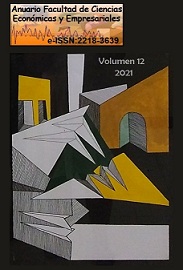Gamification: an educational strategy to improve the commercial training in the sales force
Keywords:
gamification, educational strategy, commercial training, sales forceAbstract
The present study aims to explore the elements and strategies that a commercial training program should contain that uses gamification as a tool that facilitates the learning process of the sales force of a Peruvian financial entity. For this, a qualitative methodology was used, using as an instrument a semi-structured interview with two Peruvian experts in gamification. Experts propose that the development of gamification in business training should align with the learning objectives, emphasize mobile technology, have a strong, clear and sustained narrative, and contain continuous elements of surprise to maintain the interest of sellers. Finally, experts agree in recommending the use of gamification as a strategy to train the sales force commercially.
References
Banco de Crédito del Perú. (s/f). Banco de Crédito del Perú | ViaBCP. Recuperado de https://www.viabcp.com/
Burke, B. (2012). Gamification: Engagement Strategies for Business and IT. Recuperado de https://www.gartner.com/en/documents/2246217
Danelli, F. (2015). Implementing game design in gamification. En Gamification in education and business (pp. 67-79). Springer, Cham. DOI: https://doi.org/10.1007/978-3-319-10208-5_4
Deroncele, A. (2020a). Paradigmas de investigación científica. Abordaje desde la competencia epistémica del investigador. Revista Arrancada, 20(37), 211-225.
Deroncele, A. (2020b). Competencia epistémica del investigador. En A. M. de Vicente Domínguez y N. Abuín Vences (Coords), LA COMUNICACIÓN ESPECIALIZADA DEL SIGLO XXI (pp. 53-77). Madrid, España: McGraw-Hill. ISBN: ISBN: 978-84-486-2434-7
Deroncele, A., Medina, P., y Gross, R. (2020). Gestión de potencialidades formativas en la persona: reflexión epistémica y pautas metodológicas. Universidad y Sociedad, 12(1), 97-104.
Deroncele, A. (2017). Dinámica de la intervención psicosocial en el contexto organizacional. En Herramientas para la Intervención Psicosocial en el Desarrollo Humano en el Oriente Cubano, desde una Perspectiva Integradora. Alemania: Editorial GRIN VERLAG. p.174. Recuperado de http://www.grin.com/es/e-book/372153/herramientas-para-la-intervencion-psicosocial-en-el-desarrollo-humano-en
Deterding, S., Dixon, D., Khaled, R., & Nacke, L. (2011). From game design elements to gamefulness: defining” gamification”. En A.Lugmayr, H. Franssila, C. Safran, I. Hammouda (Eds.), Proceedings of the 15th international academic MindTrek conference: Envisioning future media environments (pp. 9-15). https://doi.org/10.1145/2181037.2181040
Goethe, O. (2019). Gamification Mindset. Springer International Publishing. https://doi.org/10.1007/978-3-030-11078-9
Guiltinan, J. P., Gordon W. Paul, & Madden, T. J. (2005). Gerencia de marketing : estrategias y programas. McGraw Hill.
Hernández-Sampieri, R. y Mendoza, C. P. (2018). Metodología de la investigación: las rutas cuantitativa, cualitativa y mixta. McGraw Hill México.
Hopkins, T. (2015). How to Master the Art of Selling. Made for Success Publishing.
Kapp, K. M. (2012). The Gamification of Learning and Instruction: Game-based Methods and Strategies for Training and Education. John Wiley & Sons.
Kim, S., Song, K., Lockee, B., & Burton, J. (2018). Gamification in Learning and Education. Springer International Publishing. https://doi.org/10.1007/978-3-319-47283-6
Kotler, P., & Armstrong, G. (2012). Marketing. Pearson Educación de México, S.A.
Landers, R. N. (2014). Developing a Theory of Gamified Learning: Linking Serious Games and Gamification of Learning. Simulation and Gaming, 45(6), 752–768. https://doi.org/10.1177/1046878114563660
León Valbuena, N. I. (2013). Fuerza de ventas determinante de la competitividad empresarial. Revista de Ciencias Sociales (RCS), XIX(2), 379–389. https://doi.org/10.31876/rcs.v19i2.25629
Marczewski, A. (2013). Gamification: A Simple Introduction. Andrzej Marczewski.
Rocha, E. M., Pereira, G. M., & Pacheco, D. A. de J. (2019). The role of the predictive gamification to increase the sales performance: a novel business approach. Journal of Business & Industrial Marketing, 35(5), 817–833. https://doi.org/10.1108/JBIM-01-2019-0005
Superintendencia de Banca, Seguros y AFP. (2021). Personal según Categoría Laboral por Empresa Bancaria. https://www.sbs.gob.pe/app/stats_net/stats/EstadisticaBoletinEstadistico.aspx?p=1#
Superintendencia de Banca, Seguros y AFP. (2021). Ranking de Créditos, Depósitos y Patrimonio. https://www.sbs.gob.pe/app/stats_net/stats/EstadisticaBoletinEstadistico.aspx?p=1#
Tecnológico de Monterrey. (2016). EduTrends. Gamificación. Observatorio de Innovación Educativa. https://observatorio.tec.mx/edutrendsgamificacion
Werbach, K., & Hunter, D. (2012). For the Win: How Game Thinking Can Revolutionize Your Business. Wharton Digital Press.
Woźniak, J. (2020). Gamification for Sales Incentives. Contemporary Economics, 14(2), 144–161. https://doi.org/10.5709/ce.1897-9254.337
Yusuff, S. A., Oladimeji, M. S., Ahmodu, O. L., & Adeniyi, A. B. (2019). Gamification on Sales Force Performance in Nigeria Bottling Company. Games Review, 4(1), 1–8. https://doi.org/10.18488/journal.100.2019.41.1.8
Zichermann, G., & Cunningham, C. (2011). Gamification by design: Implementing game mechanics in web and mobile apps. O’Reilly Media.
Zinger, D. (2014, Mayo). Game on. A primer on gamification for managers. TD Magazine. https://www.td.org/magazines/td-magazine/game-on-a-primer-on-gamification-for-managers
Published
Issue
Section
License
Copyright (c) 2021 Alexander Toribio-López, Eduardo Robles-Rojas

This work is licensed under a Creative Commons Attribution-NonCommercial-NoDerivatives 4.0 International License.
Esta revista proporciona un acceso abierto inmediato a su contenido, basado en el principio de que ofrecer al público un acceso libre a las investigaciones ayuda a un mayor intercambio global de conocimiento.
This journal provides immediate open access to its content, based on the principle that providing the public with free access to research supports a greater global exchange of knowledge.



























 Universidad de Oriente
Universidad de Oriente 